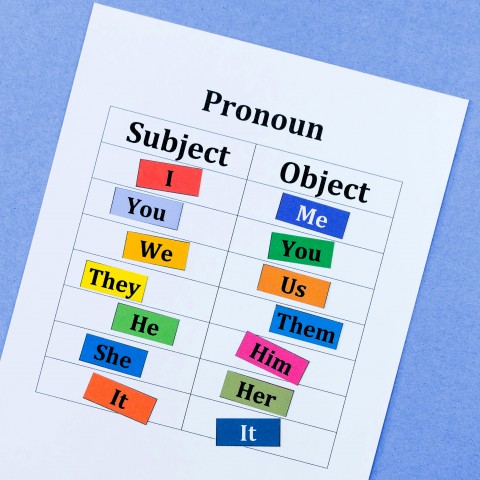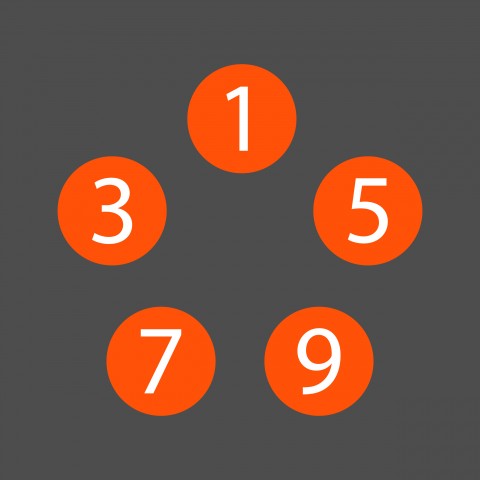
Learning a new language is an exciting adventure.
When you first set out, it feels like you’re making progress every day. But at the same time, it’s easy to become overwhelmed with all of the new words and expressions you have to memorize!
We know it can be hard to choose where to start. That’s why we’ve prepared this masterlist of 200+ essential Polish words for beginners. As you study and practice using these everyday words, you’ll be able to start having your first conversations in Polish.
Let’s get started.
 Table of Contents
Table of Contents
- Polish Pronouns
- Numbers in Polish
- Polish Nouns
- Polish Verbs
- Useful Polish Adjectives
- Conjunctions and Linking Words
- Other Polish Beginner Words
- Final Thoughts
1. Polish Pronouns
This is the first crucial set of Polish words for beginners, and you should learn them early on. This is because they allow you to talk about yourself and the world around you—even if you’re struggling to find the exact word for something.
Using pronouns can also make your speech sound more fluid and natural, but there are two things you should remember:
1) Polish pronouns undergo declension. This means that their form will change depending on their position in a sentence and the context.
2) In Polish, we often drop personal pronouns. Because verbs conjugate for person and number, they can often be used without a pronoun as their form implies who or what is performing the action. You would only use a pronoun for emphasis or clarity.
Personal Pronouns

- “I” – ja
- “you” – ty
- “he” – on
- “she” – ona
- “it” – ono
- “we” – my
- “you” – wy
- “they” – oni (masculine) / one (feminine)
Demonstrative Pronouns
Demonstratives are another essential group of pronouns, and they’re used to “point” to a specific object, animal, or person.
- “this” – ten (masculine) / ta (feminine) / to (neuter)
- “that” – tamten (masculine) / tamta (feminine) / tamto (neuter)
- “these” – te (non-masculine) / ci (masculine)
- “those” – tamte (non-masculine) / tamci (masculine)
Interrogative Pronouns
Last but not least, there are interrogative pronouns. These pronouns are used to ask questions:
- “what” – co
- “who” – kto
- “where” – gdzie
- “how” – jak
- “why” – dlaczego
- “how much” – ile
These easy Polish words for beginners are useful for things like asking for directions, asking the time, or looking for a bathroom.
2. Numbers in Polish

The next set of words that beginners should add to their Polish vocabulary is numbers. Here are the numbers 1-10 in Polish:
- “one” – jeden / raz
- “two” – dwa
- “three” – trzy
- “four” – cztery
- “five” – pięć
- “six” – sześć
- “seven” – siedem
- “eight” – osiem
- “nine” – dziewięć
- “ten” – dziesięć
Would you like to take it past the beginner level? Then study the numbers 11 to 100 and 100 to 10,000 with us.
3. Polish Nouns
Once you have the pronouns and basic numbers under your belt, it’s time to start focusing your attention on the nouns. This key category of Polish beginner words will allow you to form complete sentences when used with verbs, or even to get an urgent point across in a pinch!
Time
Telling the time and making plans are important skills for beginners to master. Here’s some time-related vocabulary to get you started on the right foot:
- “hour” – godzina
- “minute” – minuta
- “morning” – rano
- “afternoon” – popołudnie
- “day” – dzień
- “month” – miesiąc
- “year” – rok
- “Monday” – poniedziałek
- “Tuesday” – wtorek
- “Wednesday” – środa
- “Thursday” – czwartek
- “Friday” – piątek
- “Saturday” – sobota
- “Sunday” – niedziela
Would you also like to learn the months of the year in Polish?
People

There are many nouns that you can use to label yourself or those who are close to you. Let’s start with some of the most common professions:
- “seller” – sprzedawca (m.) / sprzedawczyni (f.)
- “waiter” – kelner (m.) / kelnerka (f.)
- “principal” or “business director” – dyrektor (m.) / dyrektorka (f.)
- “teacher” – nauczyciel (m.) / nauczycielka (f.)
- “chef” – kucharz (m.) / kucharka (f.)
- “police officer” – policjant (m.) / policjantka (f.)
Many Polish professions don’t have a feminine form; the masculine form is used for both genders. A good example is the word taksówkarz (“taxi driver”). Speaking of taxis, here’s some survival vocabulary for taking a taxi from the airport.
Equally important, here are the essential terms for family members:
- “mom” – mama
- “dad” – tata
- “son” – syn
- “daughter” – córka
- “child” – dziecko
- “husband” – mąż
- “wife” – żona
So, how should you address people you’re not related to? In casual contexts, you should use the word “you” – ty. In formal contexts, you should rather use the words “Mr.” – Pan and “Ms.” – Pani.
Places
There are many basic Polish words for beginners that relate to places you can visit. To get you started, here are the names of places around town:
- “hospital” – szpital
- “supermarket” – supermarket
- “school” – szkoła
- “hairdresser” – fryzjer
- “office” – biuro
- “gym” – siłownia
- “park” – park
School and Office Essentials

If you plan to study or work in Poland for any period of time, you should learn these school and office essentials:
- “pen” – długopis
- “notebook” – zeszyt
- “book” – książka
- “pencil” – ołówek
- “crayons” – kredki
- “desk” – biurko
- “chair” – krzesło
- “computer” – komputer
- “mouse” – myszka
- “keyboard” – klawiatura
Are you interested in how the Polish school system looks? Check out this article to get a glimpse!
Body Parts
Learning the names of body parts in Polish is a good idea if you plan on staying in the country for any length of time. You never know when you’ll need medical assistance!
- “eyes” – oczy
- “nose” – nos
- “face” – twarz
- “arm” – ramię
- “mouth” – usta
- “leg” – noga
- “ear” – ucho
- “knee” – kolano
- “head” – głowa
- “stomach” – brzuch

Food
Polish food is really delicious! While the names of Polish dishes often have no translation in English, there is some other food-related vocabulary you should learn as a beginner. Here are some easy words to get you started:
- “vegetables” – warzywa
- “fruit” – owoce
- “meat” – mięso
- “milk” – mleko
- “egg” – jajko
- “sugar” – cukier
- “salt” – sól
- “apple” – jabłko
- “banana” – banan
- “chocolate” – czekolada
Do you have a sweet tooth? Read about the best of the best when it comes to Polish candy.
4. Polish Verbs
Verbs are crucial Polish words for beginners to learn, as they work with nouns to form complete sentences. Here are two lists of absolutely must-know verbs in Polish:
Daily Routine Verbs
As a Polish beginner, knowing how to talk about your daily routine will frequently come in handy. It will allow you to answer questions about your life that people may ask. In the list below, you’ll find the perfective (“completed”) verbs first and their imperfective (“incompleted”) counterparts second:
- “to get up” – wstać / wstawać
- “to wake up” – obudzić się / budzić się
- “to take a bath” – umyć się / myć się
- “to brush one’s hair” – uczesać się / czesać się
- “to shave” – ogolić się / golić się
- “to eat” – zjeść / jeść
- “to drink” – wypić / pić
- “to go” – pójść / iść
- “to leave” – wyjść / wychodzić
- “to work” – pracować
- “to study” – nauczyć się / uczyć się
- “to drive” – pojechać / jechać
Other Common Polish Verbs
Here are some other essential Polish verbs that every beginner should learn straight away:
- “to give” – dać / dawać
- “to get” – dostać / dostawać
- “to do” or “to make” – zrobić / robić
- “to let” – pozwolić / pozwalać
- “to ask” – poprosić / prosić
- “to smile” – uśmiechnąć się / uśmiechać się
- “to find” – znaleźć / znajdować
- “to read” – przeczytać / czytać
- “to write” – napisać / pisać
- “to buy” – kupić / kupować
- “to pay” – zapłacić / płacić
- “to talk” – porozmawiać / rozmawiać
We have many other resources about Polish verbs on PolishPod101.com. Go exploring to learn even more useful verbs in Polish for beginners!
5. Useful Polish Adjectives
The next category on our list of Polish words for beginners is adjectives. These are the words we use to describe or add information to a noun, and they can help liven up your speech or writing.
Adjectives for Describing Objects
- “big” – duży
- “small” – mały
- “long” – długi
- “short” – krótki
- “vast” – szeroki
- “narrow” – wąski
- “colorful” – kolorowy
- “black” – czarny
- “white” – biały
- “green” – zielony
- “gray” – szary
- “red” – czerwony
Adjectives for Describing People
Being able to describe people is equally important as being able to describe objects (if not more important). Here are some adjectives you can use:
- “pretty” – ładny
- “sporty” – wysportowany
- “handsome” – przystojny
- “tall” – wysoki
- “short” – niski
- “blond” – blondyn (m.) / blondynka (f.)
- “brunette” – brunet (m.) / brunetka (f.)
- “redhead” – rudy
- “nice” – miły
- “sociable” – towarzyski
Adjectives for Describing Emotions and States of Being

- “happy” – szczęśliwy
- “unhappy” – nieszczęśliwy
- “sad” – smutny
- “content” – zadowolony
- “angry” – zły
- “upset” – zdenerwowany
- “stressed” – zestresowany
- “tired” – zmęczony
- “healthy” – zdrowy
- “sick” – chory
Describing the Weather
Last but not least, you should be able to describe the weather. Here’s the vocabulary you’re going to need:
- “rainy” – deszczowo
- “cloudy” – pochmurnie
- “windy” – wietrznie
- “sunny” – słonecznie
- “warm” – ciepło
- “cold” – zimno
- “hot” – gorąco
Are you planning to travel to Poland soon? You might want to study up on the climate in Poland first.
6. Conjunctions and Linking Words
We’ve given you many words to study already, but you can’t really make a fluid sentence without using conjunctions. You should start practicing the following Polish beginner words as soon as possible.
- “and” – i
- “but” – ale
- “then” – wtedy
- “because” – ponieważ
- “so” – więc
- “that’s why” – to dlatego
7. Other Polish Beginner Words
We’re almost done with our list of essential Polish words you need to learn as a beginner. Here’s the last set of words, which didn’t fit into any other category:
- “well” – dobrze
- “not well!” – źle!
- “really” – naprawdę
- “very” – bardzo
- “little” – mało
- “a lot” – dużo
8. Final Thoughts
If you want to speak like a native, then learning the Polish beginner words from our list is a great place to start. Once you master the essential nouns, verbs, adjectives, and other word categories, you’ll be able to start forming your first sentences. These words will serve as a solid foundation upon which to build your Polish skills over time.
How many of these words did you know already? Were most of them new to you? We look forward to hearing from you in the comments!
Naturally, learning these words will not be enough to turn you into a fluent Polish speaker. To get there, you’ll need a well-designed and structured way of learning. The countless resources available at PolishPod101.com will help you do exactly that!
Our website and app provide many functionalities aimed specifically at helping you learn the vocabulary you need. In addition, our recordings and videos by native speakers will help you work on your comprehension skills. By following one of the carefully tailored pathways on our website, you can be sure that you won’t miss out on any important concepts.
Create your account today and check it out for yourself!










